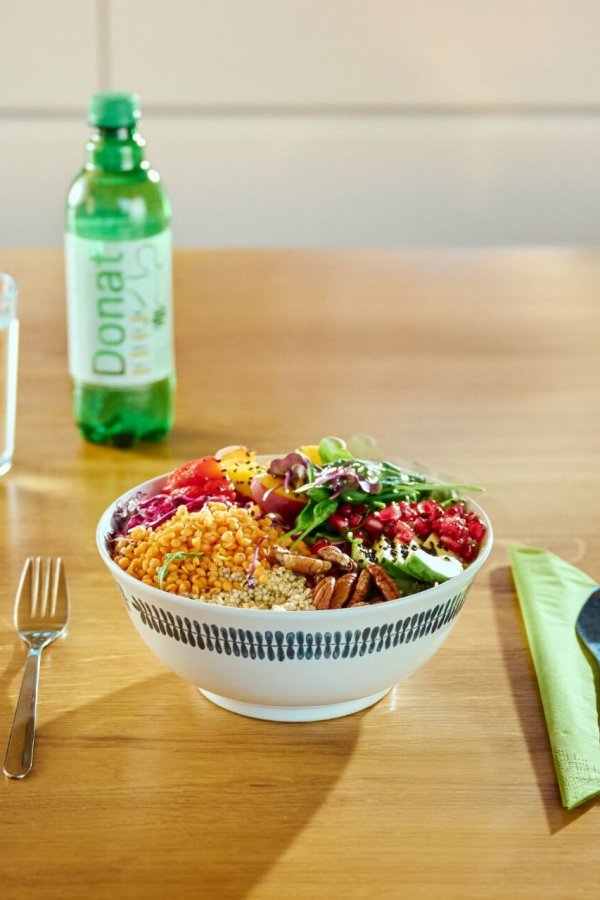Gut health has become a central topic in numerous studies and discussions about nutrition in recent years. Our gut is not just an organ for digestion and absorption; it plays a crucial role in maintaining overall health. Gut health depends on the mucosal immune system, the intestinal barrier, and the gut microbiota. Therefore, it is unsurprising that a varied diet, rich in colorful foods, is one of the most important factors for maintaining gut health.
Numerous studies show that dietary components can influence changes in the gut microbiota, which consists of over 100 trillion microorganisms in our intestines. They act like a “mini-ecosystem” within the gut, where different microorganisms collaborate in digesting food, protecting against pathogens, synthesizing vitamins and other important nutrients, and maintaining a healthy immune system. When the microbiota balance is disturbed, dysbiosis occurs, a condition in which harmful bacteria outnumber the beneficial ones. The gut is also closely linked to our immune system; as much as 80% of our immune system is located in the gut, making it crucial to maintain a healthy microbiota that helps defend against infections and diseases.
Every Color Matters: How Colorful Food Supports Gut Health
Colors on the plate are not just an aesthetic addition but play an important role in providing a wide range of nutrients that our body needs for optimal functioning. Different colors of fruit and vegetables indicate the presence of phytochemicals, antioxidants, and vitamins, which offer unique benefits for our health. One of the simplest ways to improve gut health is to include colorful foods in your diet.
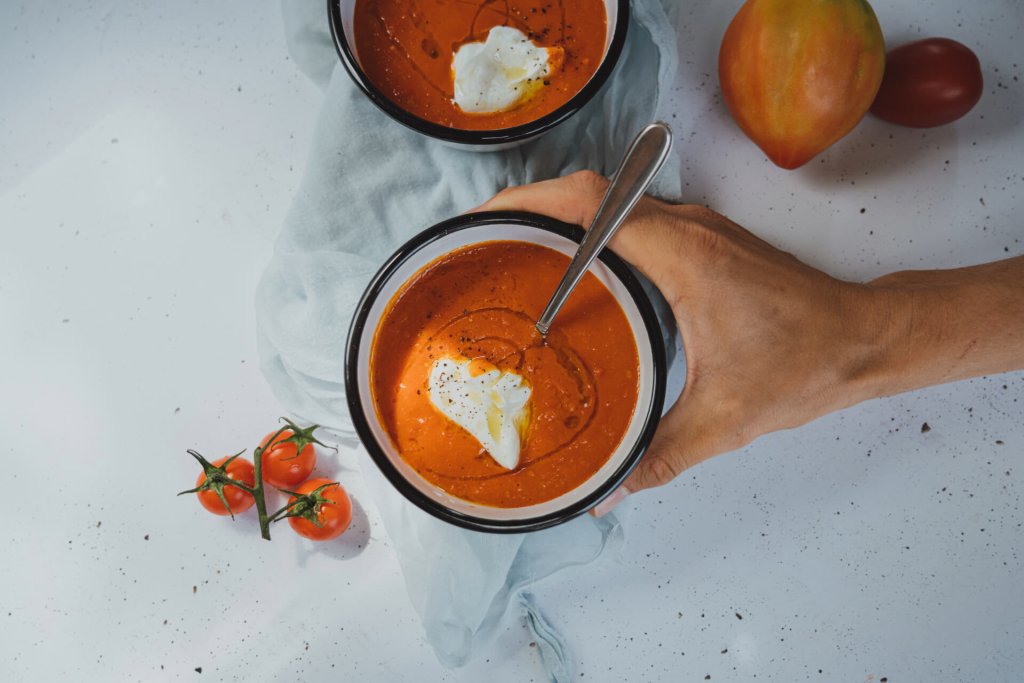
Red Foodstuffs
Red foodstuffs like tomatoes, strawberries, watermelon, pomegranate, and red peppers are rich in lycopene, a type of carotenoid that acts as a powerful antioxidant, reduces inflammation and supports heart health. Additionally, lycopene helps protect intestinal cells from oxidative stress, which is crucial for preventing damage and disease.

Orange and Yellow Foodstuffs
Carotenoids make up a group of more than 700 fat-soluble compounds which primarily give yellow to red color to many foodstuffs. Carrots, pumpkins, sweet potatoes, citrus fruit, egg yolk, and mangoes are rich in beta-carotene. Carotenoids are quite stable, regardless of cooking and storage, but exposure to extremely high temperatures can alter them. Beta-carotene is converted in the body into vitamin A which is crucial for the immune system and maintaining the health of the intestinal lining. Orange and yellow foodstuffs also contain other carotenoids that contribute to eye and skin health.
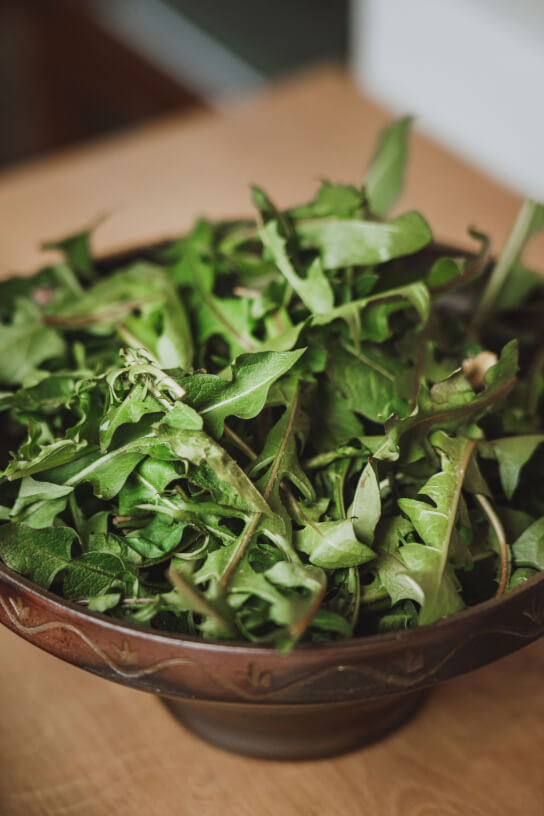
Green Foodstuffs
Green foodstuffs like spinach, broccoli, kale, and kiwi contain chlorophyll, fiber, vitamin K, and folates. Fiber is essential for healthy digestion as it stimulates peristalsis and helps eliminate waste from the body. Vitamin K is crucial for blood clotting and bone health, while folates support cell growth and division.
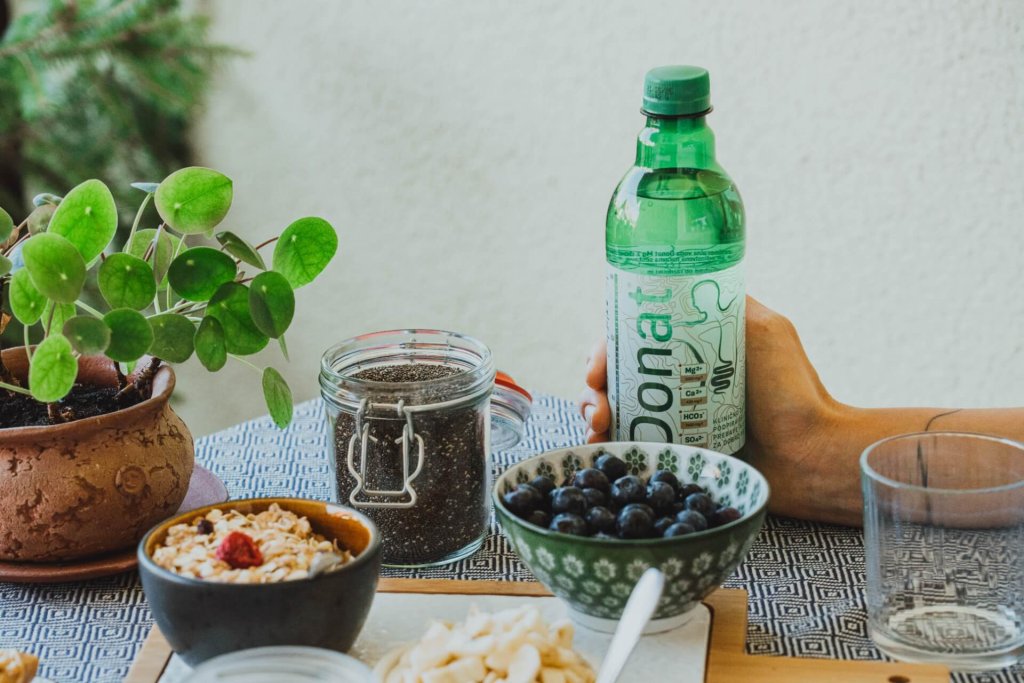
Blue and Purple Foodstuffs
Blueberries, grapes, plums, raspberries, eggplant, and red cabbage are rich in anthocyanins, a type of flavonoid. These natural, water-soluble plant pigments give plants their purple, red, and blue hues. Anthocyanins reduce the risk of diseases related to oxidative stress, such as cardiovascular, neurodegenerative, and inflammatory diseases and also improve the function of the gut microbiota.
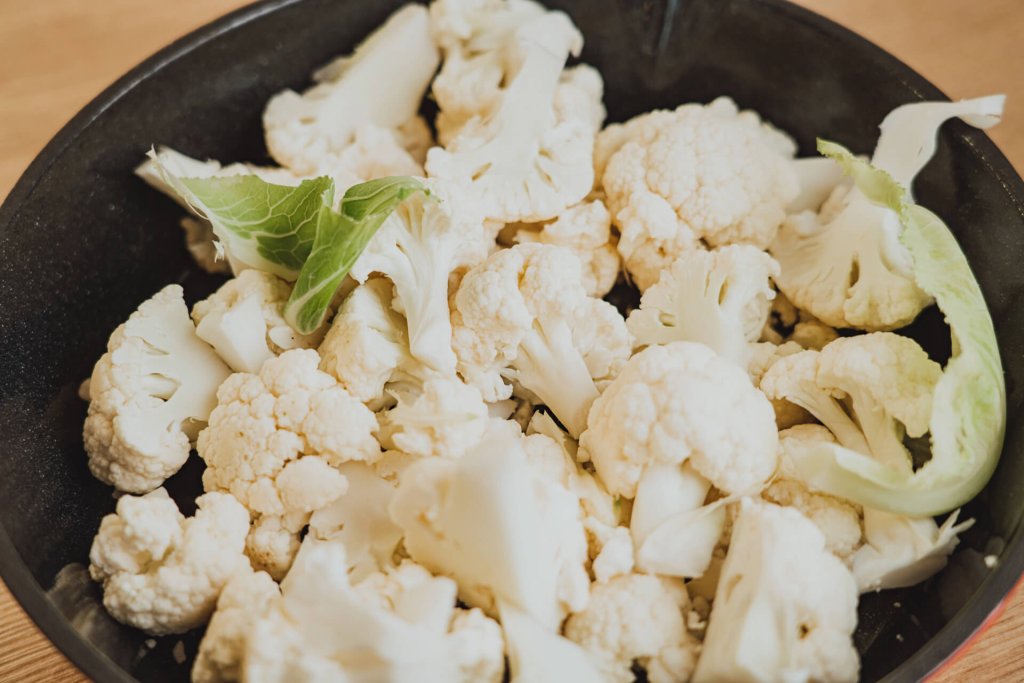
White Foodstuffs
Garlic, onions, leeks, mushrooms, and cauliflower contain flavonoids and sulfur compounds. These substances have antimicrobial properties and support healthy gut flora. Allicin, found in garlic, has antiviral properties that strengthen the immune system and help prevent infections.
Dietary Fiber: The Foundation of Healthy Digestion
Dietary fiber is one of the most important elements of a diverse diet, especially when it comes to gut health. These are complex carbohydrates that human enzymes cannot fully break down, so they are fermented by bacteria in the large intestine, bringing numerous health benefits. Fiber-rich foods include vegetables, whole grains, and fruit. Research shows that a diet rich in fiber and phytochemicals supports the diversity and richness of the gut microbiota, which is linked to better health. On the other hand, a diet high in saturated fats, sugar, and processed foods can cause an imbalance in the microbiota, potentially leading to health issues.
Soluble fiber, found in oats, barley, fruit (e.g., apples, citrus fruit, berries, pears), legumes, and vegetables (e.g., carrots, sweet potatoes, broccoli), dissolves in water and forms a gel that slows digestion and helps regulate blood sugar levels. It promotes the growth of beneficial bacteria in the gut, acting as a prebiotic.
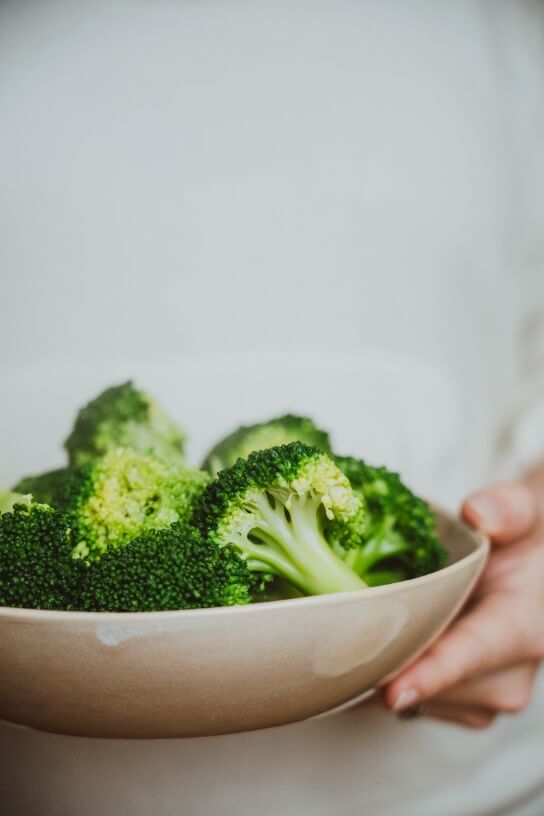
Insoluble fiber does not dissolve in water and acts as a ballast, preventing constipation and maintaining regular digestion. It is found in whole grains, nuts, seeds, legumes, and vegetables (e.g. leafy greens, cucumbers, tomatoes, cabbage, bell peppers, zucchini) as well as in fruit (e.g. apple peels, grapes, prunes).
A combination of both types of fiber is key to maintaining gut health. The fermentation of fiber in the large intestine produces short-chain fatty acids (SCFAs), which are important for gut health. They serve as an energy source for the cells of the intestinal lining, reduce inflammation, and support a healthy microbiota.
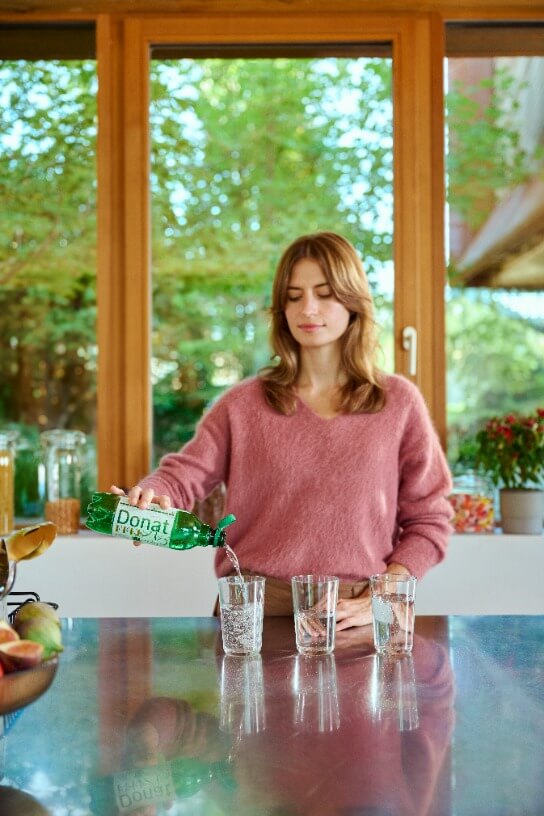
Drinking Donat: Support for the Digestive System
In addition to a diverse and balanced diet, drinking Donat mineral water can effectively support the digestive system. Donat is a natural mineral water rich in magnesium, calcium, bicarbonates, and sulfates. It is important to follow the recommended consumption guidelines to achieve optimal effects.
It is recommended to drink Donat as part of your daily digestive care, as it supports the functioning of the digestive system when combined with a varied diet and a healthy lifestyle.
Instructions for drinking Donat:
- In the morning, on an empty stomach: 0,2 – 0,3 liter, slowly, at room temperature.
- Before lunch: 0,1 liter.
- Before dinner: 0,1 – 0,2 liter.
Donat can be consumed long-term as it helps maintain regular digestion and contributes to overall good health.
Incorporating colorful foods into your daily diet is a simple yet effective step towards better health and overall well-being. Enjoying a varied and balanced diet rich in fiber and colorful foods, combined with drinking Donat, creates a strong foundation for preserving the health of the gut and the entire body.
Reference list
- Blaut, M. Relationship of Prebiotics and Food to Gut Microbiota. Encyclopedia of Food Microbiology (Second Edition) 2014, 213-222. https://doi.org/10.1016/B978-0-12-384730-0.00262-7
- British Nutrition Foundation. Gut health – the role of diet [Internet]. Dostupno na: https://www.nutrition.org.uk. Pristup je izvršen u kolovozu 2024.
- Donat Mg. Naravna mineralna voda z magnezijem (Prirodna mineralna voda s magnezijem) [Internet]. Dostupno na: https://www.donat.com. Pristup je izvršen u kolovozu 2024.
- Lingmin Tian, Yisha Tan, Guowei Chen, Gang Wang, Jianxia Sun, Shiyi Ou, Wei Chen & Weibin Bai (2018): Metabolism of anthocyanins and consequent effects on the gut microbiota, Critical Reviews in Food Science and Nutrition, DOI: 10.1080/10408398.2018.1533517
- Martini, D.; Negrini, L.; Marino, M.; Riso, P.; Del Bo, C.; Porrini, M. What Is the Current Direction of the Research on Carotenoids and Human Health? An Overview of Registered Clinical Trials. Nutrients 2022, 14, 1191. https://doi.org/10.3390/nu14061191
- Pedersen, S.D.; Jespersen, L.; Jensen, S.B.; Claesson, M.J.; O’Toole, P.W.; Prentice, R.L. Composition and Diversity of the Gut Microbiota in Older Adults: A Systematic Review. Molecular Nutrition & Food Research 2022, 66, e2200088. https://doi.org/10.1002/mnfr.202200088
- Sheflin, A.M.; Melby, C.L.; Carbonero, F.; Weir, T.L. Linking Dietary Patterns with Gut Microbial Composition and Function. Gut Microbes 2017, 8, 113-129. https://doi.org/10.1080/19490976.2016.1270807
- Verediano, T.A.; Stampini Duarte Martino, H.; Dias Paes, M.C.; Tako, E. Effects of Anthocyanin on Intestinal Health: A Systematic Review. Nutrients 2021, 13, 1331. https://doi.org/10.3390/nu13041331
- Yin, R.; Kuo, H.C.; Hudlikar, R.; Sargsyan, D.; Li, S.; Wang, L.; Wu, R.; Kong, A.N. Gut microbiota, dietary phytochemicals and benefits to human health. Current Pharmacology Reports 2019, 5, 332-344. https://doi.org/10.1007/s40495-019-00196-3
Choose chapter:
